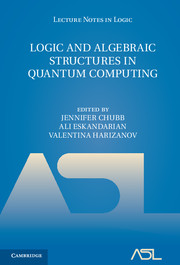Book contents
- Frontmatter
- Contents
- Preface
- Introduction
- 1 A (very) brief tour of quantum mechanics, computation, and category theory
- 2 Could logic be empirical? The Putnam-Kripke debate
- 3 The essence of quantum theory for computers
- 4 Fiber products of measures and quantum foundations
- 5 Operational theories and categorical quantum mechanics
- 6 Relating operator spaces via adjunctions
- 7 Topos-based logic for quantum systems and bi-Heyting algebras
- 8 The logic of quantum mechanics – Take II
- 9 Reasoning about meaning in natural language with compact closed categories and Frobenius algebras
- 10 Knot logic and topological quantum computing with Majorana fermions
- Index
Preface
Published online by Cambridge University Press: 05 June 2016
- Frontmatter
- Contents
- Preface
- Introduction
- 1 A (very) brief tour of quantum mechanics, computation, and category theory
- 2 Could logic be empirical? The Putnam-Kripke debate
- 3 The essence of quantum theory for computers
- 4 Fiber products of measures and quantum foundations
- 5 Operational theories and categorical quantum mechanics
- 6 Relating operator spaces via adjunctions
- 7 Topos-based logic for quantum systems and bi-Heyting algebras
- 8 The logic of quantum mechanics – Take II
- 9 Reasoning about meaning in natural language with compact closed categories and Frobenius algebras
- 10 Knot logic and topological quantum computing with Majorana fermions
- Index
Summary
This project grew out of a Special Session on Logic and the Foundations of Physics at the 2010 North American Annual Meeting of the Association for Symbolic Logic. Many of the session's lecturers investigated the role of algebraic structures in the context of the foundations of quantum physics, especially in quantum information and computation. In addition to this session, attendees heard tutorial lectures on quantum computing (given by Bob Coecke, University of Oxford) and an invited lecture on intuitionistic quantum logic (by Klaas Landsman, Radboud University, Nijmegen). The talks were so well-received by conference participants that we felt a volume of collected works on this subject would be a valuable addition to the literature.
The articles in this volume by mathematicians, philosophers, and scientists address foundational issues and fundamental abstract structures arising in highly active areas of theoretical, mathematical, and even experimental physics relevant to quantum information and quantum computation. We hope that the present collection advances this worthwhile program of scientific and mathematical progress.
We would like to thank the authors that contributed to this volume, and the ASL and Cambridge University Press for publishing it. This project was partially supported by the George Washington University Centers & Institutes Facilitating Fund Grant and by the University of San Francisco Faculty Development Fund. Many thanks also to Bryan Fregoso (a University of San Francisco student) for his invaluable assistance in assembling this volume.
- Type
- Chapter
- Information
- Logic and Algebraic Structures in Quantum Computing , pp. vii - viiiPublisher: Cambridge University PressPrint publication year: 2016

